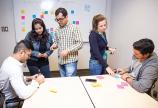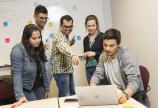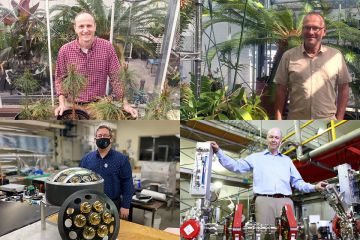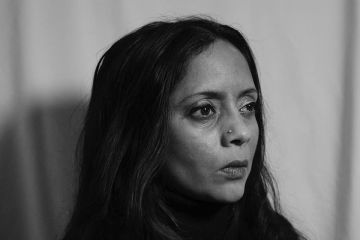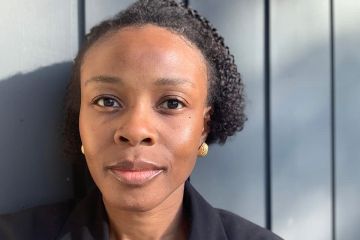Health hackathon produces collaborative, crowdsourced solutions
Engineering, Peter B. Gustavson School of Business
- Jody Paterson
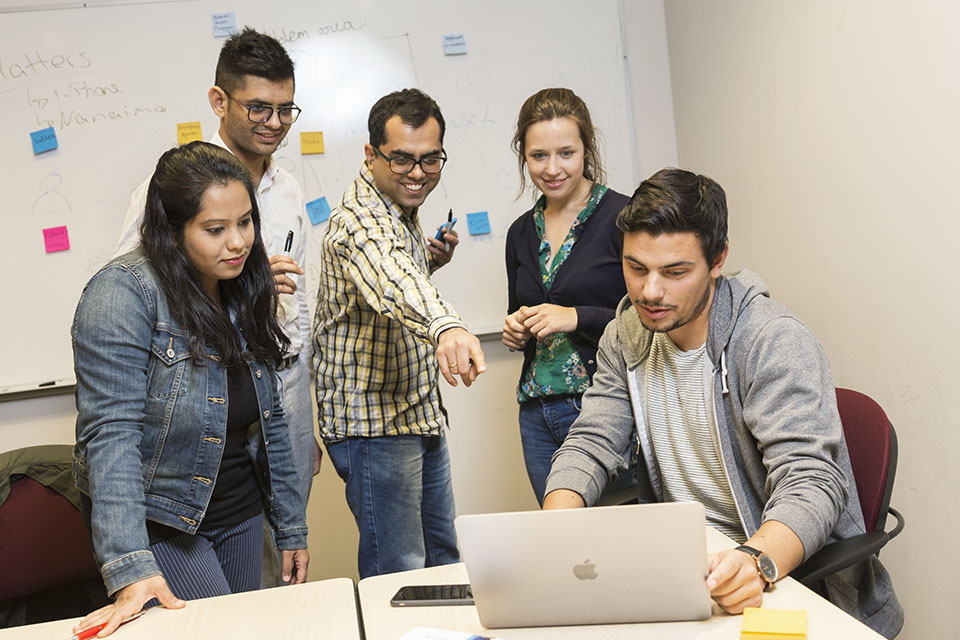
UVic kickstarts a new collaboration to tackle complex health issues—powered by local and global partnerships
When brilliant minds come together, tough problems get solved. Just ask Island Health, which now has a new way to address an issue affecting hundreds of vulnerable Vancouver Island residents after a team led by international business students in the Sardul S. Gill Graduate School at UVic’s Gustavson School of Business cracked the case.
Collaboration was a key element at the first Victoria Health Hackathon this fall, sponsored by UVic's Centre for Biomedical Research. UVic biomedical engineer Stephanie Willerth organized the weekend event specifically to bring together diverse people with wideranging experiences and expertise for 24 heated hours, tackling one of five health-related problems.
To have a team of skilled, tech-savvy, and enthusiastic individuals focused on solving this issue during the hackathon was an opportunity we couldn’t miss.
—Anna Hill, Island Health’s director of renal and trauma services
The problems ranged from developing a monitoring system to stop hospital patients from falling out of bed, to creating new adaptations for the hand/arm prostheses built by UVic’s internationally acclaimed Victoria Hand Project. Teams picked the problem of their choice and were given three weeks to mull it over, then came together for an intense weekend of trying to find a “hack” to solve the problem.
International MBA students at UVic make strides in coordinating timely support for sexual assault survivors
Team Vivek—named after team member Vivek Pissay, a UVic MBA student—settled on a particularly sensitive challenge: to identify a better method for notifying on-call forensic nurses when cases of sexual assault, abuse or domestic violence presented at any of 11 hospital emergency wards on Vancouver Island.
Island Health’s Forensic Nurse Examiner Program (FNEP) responds to more than 300 such calls every year. But the program still relies on pagers to call in a nurse from the 30-member FNEP team to the emergency room. Missing a page is a common problem, especially for nurses in more remote parts of the Island.
With no record of a page being sent or received and no mechanism for escalating paging to a second level of respondents, calls were being missed. Frustrated patients fed up with waiting were leaving the hospital before they’d been seen by a forensic nurse. Opportunities were being lost to gather physical evidence for possible criminal charges against assaulters, and to connect assault survivors with legal services.
Team Vivek went to work on the challenge, digging into the issues at the root of the problem.
“We knew from our MBA studies that we would want to ask as many questions as possible to start off with, to get to the core of the problem,” says team member Jayesh Vekariya, one of four UVic MBA students on the five-person team. “It’s like being an anthropologist.”
After several conversations with the Island Health managers who had brought the problem to the hackathon participants, the team identified three key issues: “The paging system is old technology, there’s no way to handle escalation of the process to find a second nurse if the first nurse doesn’t respond, and there’s no reporting process in place,” explains Pissay.
“Having worked in the field of healthcare internet technology (IT) in the past, I knew this was a very similar problem that you see in IT when a system goes down,” says Pissay.
“So we looked into how IT systems manage these kinds of problems, and found a platform, xMatters, that we were able to customize for health-care use. It had to meet all concerns around health-care privacy, cost point, ability to escalate calls, user friendliness. It had to be simple enough that you don’t have to be tech-savvy to use it.”
The new system connects to the on-call nurses’ cell phones. It creates a record of all calls, and automatically escalates a missed call to a second nurse and then a third if the initial call isn’t responded to. Island Health was so pleased with the proposed solution that it plans on implementing the customized xMatters system early in the new year and has already begun staff training.
And the hackathon judges were so pleased that they awarded Team Vivek the top prize—$750 to be shared among the five team members (Pissay, Vekariya, UVic MBA exchange students Maximilian Krempel and Merle Finke, and software quality analyst Pallavi Phutane). Challenges were scored based on their uniqueness, scalability, user-friendliness, and creativity.
“It was great to win, but what we also enjoyed about the hackathon was the chance to meet so many people who we never would have met otherwise,” says Vekariya. “Some of those connections have already led to further meetings to identify ways to work together on other projects. We love the collaboration at UVic.”
Other hackathon goals and prospects
Victoria’s first Health Hackathon not only resolved a difficult challenge for Island Health, but identified a number of other problems in need of innovative solutions.
Second and third prizes went to two different teams tackling the challenge put forward by Willerth, who coordinated the hackathon. She was seeking a new way to sieve the tiny drug-releasing microspheres she uses in her research to sort out the smallest of the small.
While the other three challenges put forward for the hackathon didn’t win any prizes, they provide fertile ground for future collaborative efforts between UVic researchers, community members with an interest in the problem, industry and health authorities. Those challenges were:
- To create an alert system for health-care providers caring for people living with dementia that would sound an alarm when a high-risk patient got up from their chair or bed, but didn’t require physical restraints. “The challenge is that there is no current product that can be secured to a chair or patient that does not agitate the patient. Could the group develop a chair alarm that does not alarm the patient but rather the caregiver?” noted the Island Health submission.
- To adapt the hand/arm prosthesis that the UVic-based Victoria Hand Project sends to developing countries around the world so that the hand could be taken on and off and replaced with adaptations that allow the person to hold an eating utensil, or ride a bike. “One of the first questions that amputees ask when they are being fit with a Victoria Hand is if they can use it to ride a bike,” noted the Hand Project team in its hackathon submission. “The Victoria Hand was not designed to be used for riding a bike, but now the VHP team is beginning to understand the need for a device that will allow users to safely ride a bike.”
- To develop a two-part warning system for hospitalized patients at risk of falling out of bed. Island Health noted that most available systems are intended to minimize injury, not prevent the fall in the first place. “Having identified a patient at imminent risk of a fall, a solution needs to take an action that can prevent a fall. This can be via notifying a nurse, activating a webcam, activating an alarm, calming and reassuring a patient or a combination of means.”
This was the region’s first health hackathon, but it’s not likely to be the last.
“Hackathons are a fantastic environment for networking between academia and industry, and a real opportunity for students and young professionals to showcase their skills,” writes participant Brent Godau, a graduate student in mechanical engineering at UVic, in a blog post featured on the website of one of the hackathon sponsors, Starfish Medical.
“Working in a high-pressure scenario to develop a solution that has a real chance at being implemented brings to life how formal education prepares us for work in either industry or academia.”
Photos
In this story
Keywords: health, biomedical, graduate research, engineering, business, Island Health, Victoria Hand Project, industry partnerships
People: Stephanie Willerth, Vivek Pissay, Jayesh Vekariya
Publication: The Ring

